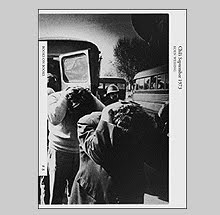Tea, Coffee, Cappuccino by Boris Mikhailov

Writing in the foreword to his 1996 book Am Boden (By the Ground) Boris Mikhailov states; The fourth year of change. Not much has been reorganized, but a lot has changed. I already notice the tendency towards a "new" society, a deterioration in the quality of life for most people and the waning hope that some time everything will turn out fine for them. He continues; To a certain extent, I was always a street photographer. I always searched the streets for historical symbols of the present times. The streets reflect social processes like a mirror. What that book and its companion Die Dämmerung (At Dusk) described was bleak - everything seems to have collapsed at once spreading, in Mikhailov's words, the feeling of a natural catastrophe. It was felt in the book's titles - the darkening end of an era and the lowered perspective pulling us to the earth. the title of his newest offering Tea, Coffee, Cappuccino published by Verlag der Buchhandlung Walther König might be signaling a lighter, more positive view. Guess again.
Photographing in his hometown of Kharkov, Mikhailov has once again taken to the streets to reflect social process. On the cover, three men laugh and smile good-naturedly at the camera, almost mocking the choices offered by the book's title. What choice has been given by the arrival of western splendor? Cappuccino? The blossoming adverts that rise above the crumbled and muddy streets? Nearly everyone in the 200 color photographs seem to be carrying shopping bags and bundles full of goods giving the impression that success has been achieved but as Mikhailov speculates "a flux of cheap commodities has conquered ubiquitously, creating a colorful new plastic reality." The previous eras long breadlines have now been replaced by lines waiting for infrequent trams.
The facing spreads form disjointed panoramics which seem a natural continuum to By the Ground and At Dusk. Mikhailov notes that the photos 'fitted together in a chronologic order: what was photographed earlier is at the beginning, and the later photos are towards the end.' This order, bracketed by images of people kicking up their heels in impromptu can-can dances, seems to show a drift into a mental state of escapism and spectacle until a Kurt Cobain Jesus makes his appearance in the final photograph.
Bookwise, Tea, Coffee, Cappuccino is straightforward in design and printing. The flow of images seems daunting because of the amount but appropriate for a book that is partly about the dream of excess. The awkward cover design seems to be a nod towards the poor design of the ever-present advertising seen throughout the book.
As in all of Mikhailov's other books his presence is felt or literally seen as both insider and outsider. In Tea, Coffee, Cappuccino he pratfalls out of a kiosk doorway and perches on a small railing trying to inject humor as an occasional diversion. This portrait of Kharkov might be his darkest work yet. Even though Case History portrayed a populace often homeless and rife with disease there was a sense that death - an end to the misery - was close at hand. In Tea, Coffee, Cappuccino, what he has shown might be the state for a long time to come.











